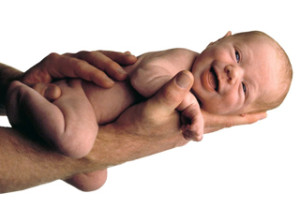 Some newborn babies delight with folds and sweet dimples, others are small and filigree. The differences are mainly due to the diet and lifestyle of their mothers. The weight of a properly nourished and full-term newborn is within 2,6 kg of 4 kg. Malnourished children, although they are not premature babies, weigh less than 2,5 kg. Newborns 4 kg and heavier are considered obese. In Poland, as much as 8 proc. babies are born with too low birth weight.
Some newborn babies delight with folds and sweet dimples, others are small and filigree. The differences are mainly due to the diet and lifestyle of their mothers. The weight of a properly nourished and full-term newborn is within 2,6 kg of 4 kg. Malnourished children, although they are not premature babies, weigh less than 2,5 kg. Newborns 4 kg and heavier are considered obese. In Poland, as much as 8 proc. babies are born with too low birth weight.
About that, how big a baby will be born, many factors decide. First of them, it is the health of the future mother. If a pregnant woman suffers from hypertension, kidney problems, pregnancy poisoning (gestosis), the baby is tiny. Very large newborns, weighing over 4, a nawet 5 kg, often give birth to mothers with diabetes.
The diet of the expectant mother is extremely important (also before pregnancy). Contrary to still lingering belief, pregnant does not have to, and she shouldn't even eat for two. Especially in recent months, when the fetus grows rapidly. When the baby is too big, there is a greater risk of injury to the mother (e.g.. cervical rupture) during childbirth. The diet of a pregnant woman must be varied, rich in vitamins and minerals, but not very abundant.
Babies of mothers addicted to nicotine are tiny and malnourished, alcohol, drugs. Also young mothers - teenage girls, whose body is not yet prepared for pregnancy, give birth to newborns with too low weight.
Bad housing and financial conditions, stress, noise, hard physical work also negatively affects the course of pregnancy and inhibits the child's development- then a small one is born.
Low weight babies are born in the regions, where the environment is polluted (e.g.. Upper Silesia, Boat). The lack of proper medical care for the pregnant woman may also have an adverse effect on the weight of the child, fetal disease (e.g.. caused by the mother's disease with rubella).
Genetic factors are also important: low child, a thin woman is usually born smaller than a tall and well built child.